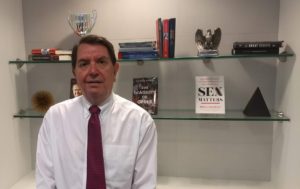This week on The Score – where do faith and reason intersect? Does the Vatican run the world’s biggest espionage operation? What is the proper role of the U.S. Department of Education? Can Winnie-the-Pooh still entertain us? The answers to these questions are pondered on our podcast for August 4, 2018.
http://bearingdrift.com/wp-content/uploads/TheScore-Aug04-2018-fullhour.mp3 [1]This week we take a look at religion and education policy, and we’ll hear Tim Hulsey’s review of the new movie, Christopher Robin.
Faith and Reason
First, faith and reason: can they co-exist? That’s the focus of my interview with Robert Royal, founder and president of the Faith and Reason Institute in Washington. Our conversation was a reunion of sorts. Bob Royal and I were colleagues at the Ethics and Public Policy Center in the 1980s [2]. On one notable occasion, he and I were among a handful of people present when Soviet dissident Andrei Sakharov, who helped develop Russia’s first thermonuclear weapon, met [3], for the first time, American physicist Edward Teller [4], called the “father of the hydrogen bomb.”
 That’s ancient history now, so my first question to Bob Royal was about news in the headlines this week: Pope Francis had modified church teaching about capital punishment. We also talked about former Cardinal Theodore McCarrick, who faces defrocking at age 88, and how the Church has handled incidents of sexual misbehavior by members of the clergy.
That’s ancient history now, so my first question to Bob Royal was about news in the headlines this week: Pope Francis had modified church teaching about capital punishment. We also talked about former Cardinal Theodore McCarrick, who faces defrocking at age 88, and how the Church has handled incidents of sexual misbehavior by members of the clergy.
The Faith and Reason Institute produces a regularly updated web site, “The Catholic Thing [5],” which is published in five languages besides English (French, Italian, Slovak, Spanish, and Portuguese), and Bob is part of a panel of commentators called the “papal posse” who appear on EWTN. (This video [6] was recorded just a couple of hours after The Score visited the Faith and Reason Institute office.)
Robert Royal is author of A Deeper Vision: The Catholic Intellectual Tradition in the Twentieth Century [7], Dante Alighieri: Divine Comedy, Divine Spirituality [8], The God That Did Not Fail: How Religion Built and Sustains the West [9], The Catholic Martyrs of the Twentieth Century: A Comprehensive World History [10], The Pope’s Army: 500 Years of the Papal Swiss Guard [11], and 1492 and All That [12], among other books.
You can follow him on Twitter at @RobertSRoyal [13] or follow The Catholic Thing at @CatholicThing [14].
,
The Pope’s Spies
While we’re on the subject of the Catholic Church, a few years ago in Charlottesville, the former U.S. Ambassador to the Holy See, Francis Rooney, came to talk about his experience as a diplomat in the Vatican. He had just written a book, The Global Vatican: An Inside Look at the Catholic Church, World Politics, and the Extraordinary Relationship between the United States and the Holy See [15], and on that day [16] at the Virginia Festival in the Book in 2014, I wanted to know what he knew about the Pope’s intelligence services [17].
Rooney also pointed out how the Vatican also is the locus of a worldwide human intelligence network, something that may be unparalleled elsewhere. Former Secretary of State Henry Kissinger, he recalled, said the Catholic Church has “one of the greatest information gathering networks in the world.”
“One of the unique aspects of the Holy See is their global network of priests, nuns, NGOs. We get so much information from them,” he said, adding that there are “millions of vignettes of Holy See information surprising the United States in its, in what they’ve been able to find out.”
He gave the example of when Cardinal Agostino Casaroli, then the Vatican Secretary of State, visited President George H.W. Bush in the Oval Office.
When the meeting took place, Rooney said, Casaroli had just been told by some nuns “about a bridge being blown up in Lebanon.” This was pertinent because the United States and the Holy See had been working together to unify Lebanese Christians. Bush and Casaroli looked at a map together, with the cardinal pointing out where the missing bridge had been located.
The president was unaware of this information, so he called the CIA, which also had not learned about it. “How do they know that?,” the CIA asked.
This recording comes “from the archives” and, since it was made, Francis Rooney has been elected to the U.S. House of Representatives from Florida. His congressional Twitter handle is @RepRooney [18].
Capital Punishment
While I had the opportunity to talk to Bob Royal about the Vatican’s new policy on the death penalty, I thought about the group, Conservatives Concerned About the Death Penalty [19]. I chatted with one of their spokesmen about the organization and its goals at the Conservative Political Action Conference – CPAC – a few years ago. Taken from the archives, this conversation with anti-death penalty activist Matt Maly of Nebraska [20] dates to March 2015.
Changing gears, our film critic, Tim Hulsey, went to the cinema this week and came back with this review of a new movie [21] based on A.A. Milne’s classic children’s stories about Winnie-the-Pooh [22]. What did he think about Ewan McGregor as Christopher Robin [23]?
Education for Citizenship
While I was putting this week’s episode of The Score together, a couple of planned interviews fell through. Fortunately, the folks at Young Voices Advocates [24] came to my rescue. Regular listeners may recall our interview with Young Voices executive director Casey Given [25] a few weeks ago.
 They set me up with Michael Shindler [26], a free lance writer and policy analyst, who recently wrote an article making the conservative case for the U.S. Department of Education. That piece in The American Conservative — entitled “On Education, Trump Needs More Aristotle and Less Betsy DeVos [27]” — attracted a lot of attention and was shared virally on the Internet. Was it because of its references to Socrates, Plato, and Aristotle? Or perhaps its invocation of Thomas Jefferson:
They set me up with Michael Shindler [26], a free lance writer and policy analyst, who recently wrote an article making the conservative case for the U.S. Department of Education. That piece in The American Conservative — entitled “On Education, Trump Needs More Aristotle and Less Betsy DeVos [27]” — attracted a lot of attention and was shared virally on the Internet. Was it because of its references to Socrates, Plato, and Aristotle? Or perhaps its invocation of Thomas Jefferson:
For a capitalist country where a basic education in the liberal arts isn’t necessarily going to be provided by market forces, heeding Aristotle means making sure the state steps in. And that’s exactly what the Founding Fathers, encouraged [28] by Thomas Jefferson, did.
In his Sixth Annual Presidential Message to Congress [29], Jefferson writes:
Education is here placed among the articles of public care, not that it would be proposed to take its ordinary branches out of the hands of private enterprise, which manages so much better all the concerns to which it is equal; but a public institution can alone supply those sciences which, though rarely called for, are yet necessary to…the improvement of the country, and some of them to its preservation.
Essentially, Jefferson argues that, despite its inefficiency relative to private enterprise, the government has a responsibility, justified in part by the precarious nature of American democracy, to erect and invest in institutions tasked with the education of the public.
Shindler and I met in the lobby of the historic Mayflower Hotel in Washington, DC. (Calvin Coolidge lived in the Mayflower when he was vice president.) The nearby crowd of tourists and conventioneers explains why you hear some hubbub and rhubarb in the background.
You can follow our guest on Twitter at @MichaelShindler [30].
Education Policy from the Archives
Since we’re talking about education, in 2010, the then-new Virginia Secretary of Education, Gerard Robinson, was the featured speaker at graduation ceremonies [31] for Piedmont Virginia Community College. Robinson had been appointed by Governor Bob McDonnell, and advocate of family choice in schooling, so my first question to Robinson was on that issue.
Gerard Robinson [32] is now the executive director at the Center for Advancing Opportunity.
Ever since libertarians came up with the idea decades ago – maybe it was Milton Friedman who first brought it to public attention – school choice plans have been considered as an alternative to government-run schools. Conservatives picked up the school choice banner and some of the ideas have been implemented on the state level.
On a couple of occasions, I had a chance to speak with Lindsey Burke [33], an alumna of the University of Virginia who became an education policy analyst at the Heritage Foundation in Washington. I asked her about school choice around the country, and learned that Virginia is behind the curve in the movement to provide more alternatives among government schools and private competitors.
Lindsey Burke is on Twitter as @LindseyMBurke [34].
As I’m taking a mini-vacation at Rehoboth Beach, The Score will be back in two weeks with more news, interviews, and reviews. Don’t forget to tell your friends where to find us. Help us keep the conversation going on The Score.